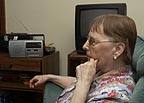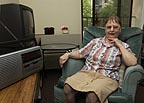May 12, 2006
Radio reading service fills void for listeners
CARBONDALE, Ill. -- Clara Bowie gets tired of listening to television. Sometimes she even gets tired of her beloved National Public Radio.
But don't take away her Southern Illinois Radio Information Service receiver, or this poet/retired educator/Internal Revenue Service employee is liable to get cranky.
"I've never had a time when I didn't want to listen to my SIRIS," said Bowie, using the acronym for the program run the last eight years by WSIU Public Broadcasting, part of Southern Illinois University Carbondale's College of Mass Communication and Media Arts.
The program provides a radio-based reading service for the vision- and print-impaired through a special "sideband" network that can be received by special receivers in their homes. Volunteers read newspapers, book reviews, magazine articles and other print-based media over the airwaves, where the receivers can pick up their efforts.
A "confirmed bookworm" as a child growing up in Baltimore, Bowie began losing her sight around age 13. Her parents sent her to a school for the blind where she learned Braille and other skills she would need to take care of herself when her sight failed completely.
Through the years, Bowie used her education degree to help those who also had lost their sight. She still volunteers for a local organization, helping those who have recently lost their sight make adjustments in their lives.
SIRIS, she said, often is a huge benefit to such individuals.
"When people lose their sight, especially older people, they feel like they've been picked up out of their world and put in a strange new world. They have to learn a lot of new skills, and some people, for various reason, can't learn Braille," Bowie explained. "SIRIS fills that void for them. People tell me it makes them feel like they're still part of the world."
SIRIS grew out of IRIS – the Illinois Radio Information Services Inc. IRIS, in turn, has its roots in a program started in 1973 by the Rev. B. L. Wittenbrink at Shrine of Our Lady of the Snows in Belleville.
SIRIS is one of 11 such services in Illinois. Other programs include those in Rockford, Rock Island, Chicago, Macomb, Peoria, Champaign, Springfield, Godfrey, Belleville and Mount Carmel. Thousands of Illinois residents now use the program, which is free to users and offers hours of local programming.
Catrina Johnson, a supervisor overseeing the daily operations of SIRIS at 1003 S. Oakland Ave., said the WSIU program signal reaches 75 miles, covering 27 counties in Southern Illinois and three in southeast Missouri. Johnson estimates it serves at least 800 people with the 400 receivers it has placed right now. While some of the receivers go to individuals, others go to nursing homes, workplaces and other public areas, where they serve groups of people.
The Illinois Secretary of State's office funds the program through the Illinois State Library. But it also relies on the local United Way and other local donations, Johnson said. The money pays for a handful of part-time staff, equipment and other items.
Volunteer readers arrive at the program's offices near the SIUC campus where they read local news in the computer system. That information is part of a mix that includes programming and national news from the In Touch network, which includes readings from The New York Times, Reader's Digest, People magazine, The New Yorker, The Wall Street Journal and Newsweek. Altogether, the service offers about 51 different programs, Johnson said.
Johnson said the program's biggest challenge is having enough volunteers to read material.
"We want to be consistent in the information we get out to our listeners and if I have 14 newspapers and two people to read that can be a big deal," she said.
Johnson said the program is flexible for its 23 volunteers, working within their availability. Most often, she asks volunteers to read a minimum of 30 minutes worth of material when they come in. Some come in often, others every now and then. Some read 30 minutes and others read several hours while they're there.
"It's up to them," Johnson said. "We don't lock them in. And it's not just reading – they can deliver radios for us or do administrative work. Whatever they bring in, we're happy to have them and we'll make them a part of the family."
A special sub-carrier of WSIU radio in both Carbondale and Mount Vernon carries the broadcast. The special program receivers contain a pre-tuned crystal that captures the transmission on 91.9 khz and 88.9 khz.
To qualify for a receiver, the individual must by blind, visually impaired or print-disabled. Persons with low vision, Alzheimer's disease or other conditions also qualify.
Many clients are seniors with eye diseases or who have suffered eye dysfunction as a result of stroke.
But the service couldn't exist locally without volunteer readers. Patrick Harwood, a retired SIUC employee, said his volunteer experience has been rewarding.
"I'm by nature a reader and I knew of the program and thought I would give it a try because I have some time on my hands," said Harward, whose clear baritone voice betrays his work on stage in theater productions of the past. "I read to everyone, my children, my grandchildren, my wife. So I thought I'd give it a try."
Harward, who began volunteering in January, travels from his home in Cobden to the SIRIS offices twice a week, donating about two hours of time reading newspapers and magazines into a digital voice recorder hooked to a computer.
"We tend to stick with the local issues like school boards," Harward said. "To me, this is a way to put people who are visually impaired back in touch with their community."
Bowie, who also serves on the advisory board for the service, said she listens steadily during the morning and evening hours, and sometimes throughout the day if she's in the mood.
"I like when they read The New York Times and the Atlantic Monthly," said Bowie, who recently published a book of poems. "The science programs and book reviews are good, too. It's just a lot more in-depth than you can get elsewhere."
Serving others is among the goals of Southern at 150: Building Excellence Through Commitment, the blueprint the University is following as it approaches its 150th anniversary in 2019.

Invaluable service – Clara Bowie
relaxes in her Carbondale home
while listening to the Southern
Illinois Radio Information
Services receiver to her right.
Blind since age 13, Bowie, who
also serves on the SIRIS
advisory board, uses the WSIU
service to get news, book
reviews and other information
and entertainment. Download
Photo Here

Invaluable service – Clara Bowie
relaxes in her Carbondale home
while listening to the Southern
Illinois Radio Information
Services receiver, foreground
left. Blind since age 13, Bowie,
who also serves on the SIRIS
advisory board, uses the WSIU
service to get news, book
reviews and other information
and entertainment. Download
Photo Here
